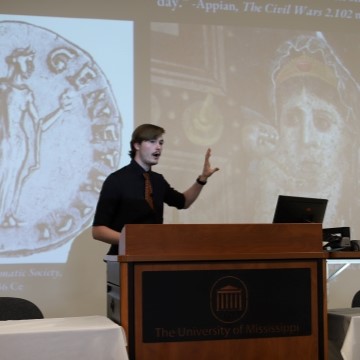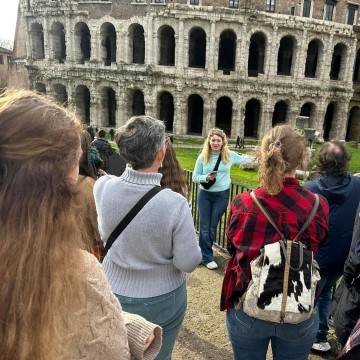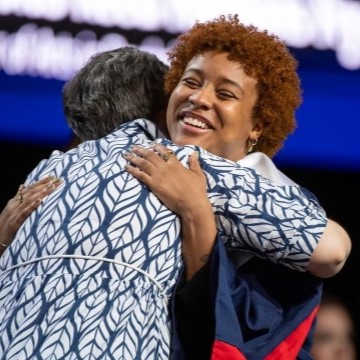Academics Programs and Offerings in Classics
Studying Classics at UM
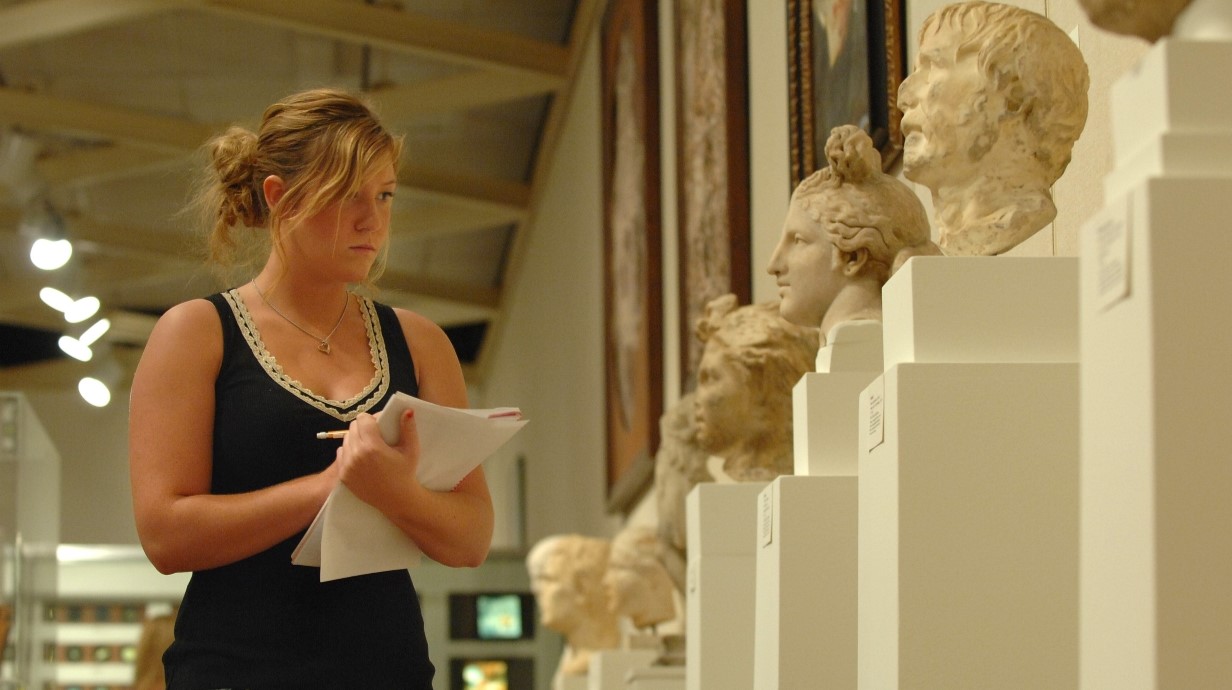
Classics Major and Minor
The Department of Classics in the College of Liberal Arts offers the minor in Classics and the Bachelor of Arts in Classics where students select an emphasis in Classical Civilization, Ancient Greek, or Latin.
Classics students gain a complex view of the ancient Mediterranean world and explore their own world as they do so. They
- address questions of human and historical significance through the works of the Greeks and Romans;
- understand the modern cultural world by recognizing its roots in the past;
- know their own language better by learning Greek or Latin;
- explore the world through study abroad; and
- strengthen their ability to read, communicate, observe, and think analytically.
Students at UM engage with classics beyond the classroom, too. They work with the 2,000 objects in the David M. Robinson Collection of Greek and Roman Antiquities housed in the University Museum. They can receive financial support for study abroad including research on ancient graffiti in Pompeii and Herculaneum or join faculty-led travel courses to Rome and other sites.
-
General Education for the B.A. Degree
Learn about the general education requirements as well as extensive course descriptions for the CLA Bachelor of Arts degree. Note that some majors recommend or require certain choices of courses to fulfill those requirements.
CLA - General Education
Beyond the Classroom
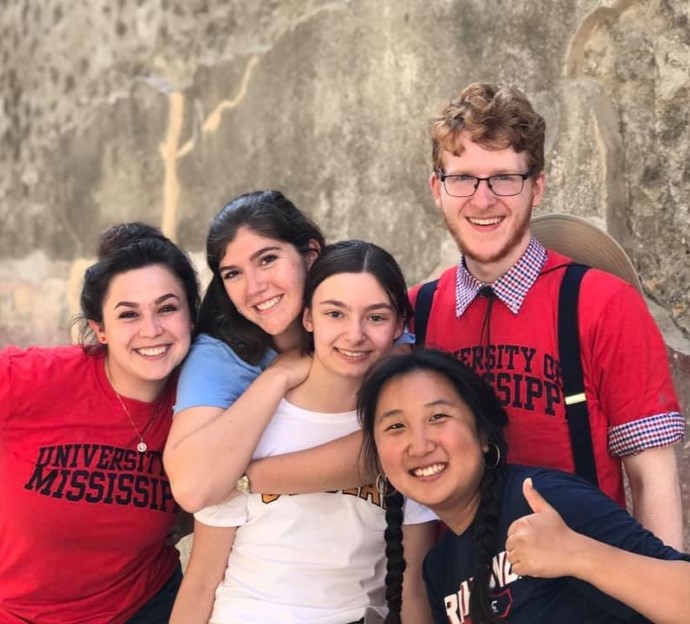
Study Abroad
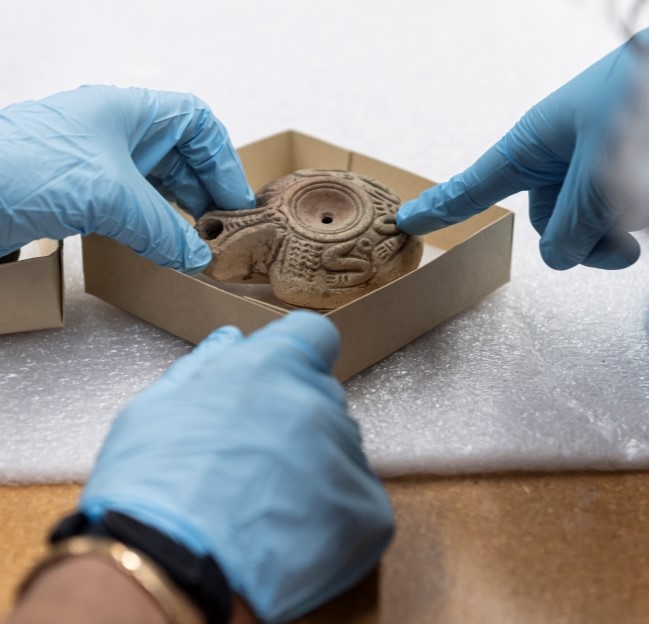
Internships
Classics majors enter all sorts of careers, and internships are the #1 desired experience on college resumes in national surveys. Employers want to know that you have experienced the professional world and have solidified your career goals through interactions in a related work place. Many Classics majors look forward to internships in museum settings, including the UM Museum.
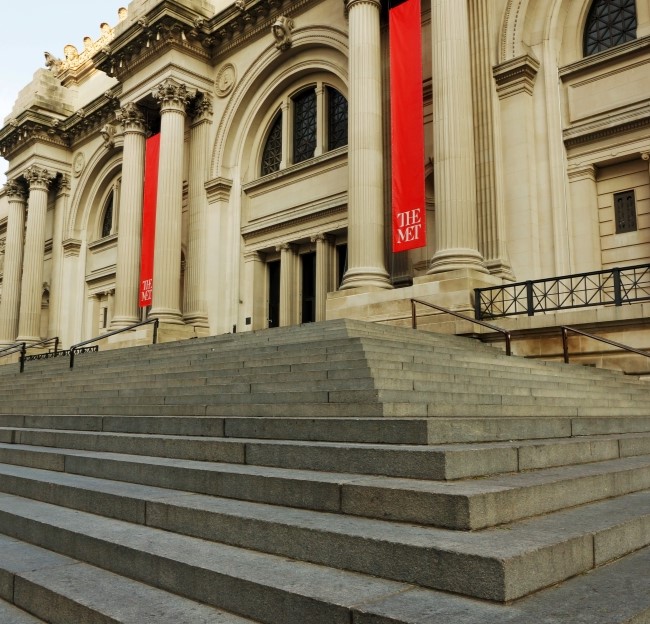
Study USA
There are three intersession (2-week) terms during the academic year that provide a convenient opportunity for faculty to offer travel courses through Study USA. The College of Liberal Arts has scholarship funds to help students better afford these extraordinary learning opportunities. Here are some museum-related travel courses to NYC, Washington DC, and Montgomery, AL.
Museums on Location
Rhetoric of Memorial Museums
Public Memory, Memorials, and Memorial Museums
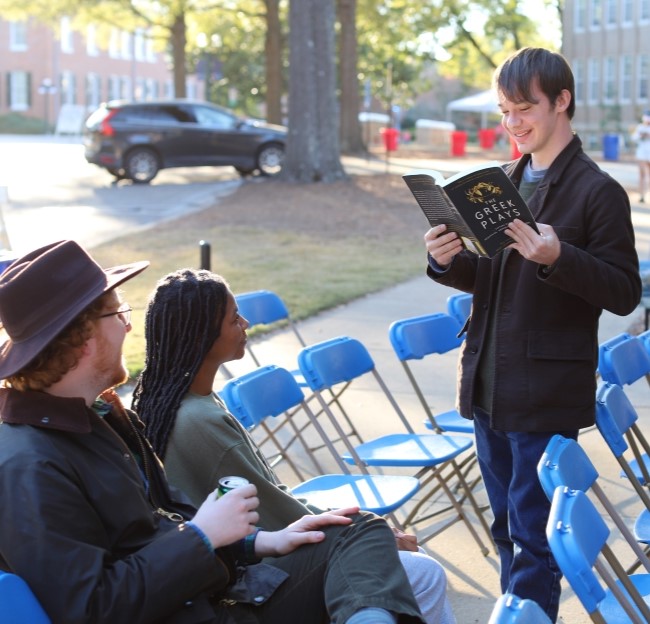
A Taste of Classics
Each year the Department of Classics and its student organization, Eta Sigma Phi, hosts events and field trips to expand student engagement with and enjoyment of classics. One event, A Taste of Classics, includes food and public readings of ancient literature on the steps of Bryant Hall.
Eta Sigma Phi
Students with an A or strong B grade point average in Latin or Greek are nominated for membership by the faculty each Spring semester.
For additional information, contact Dr. Molly Pasco-Pranger.
New members 2025: Reese Aksamit, Joseph Baxter, Grant Bohnen, Laura Brown, Carolina Cassisa, Sophia Edwards, Addyson George, Madelyn Janus, Addison Johnston, Zachary Kiser, Anneka McFarland, Ada Richardson, Pierce Romine, Emily Smith, Lucy Stackler, Natalie Tutor, Jackson Waldrip
New members 2024: Lauren Austin, Isabella Clark,Buchanan Cook, Chloe Dobbins, Peyton Holden, Jessie James, Anna Laurenzo, Clay Murry, Jerrika Pardubsky, Maguire Stackhouse, Emily Suh, Matthew Verges
New members 2023
Reese Anderson, Sarah Bexley, Kayden Breedlove, Kenneth Brown, Adele Cardwell, Lynnlee Causey, Lauren Cepluch, John Clark, Ainsley Corwin, Joseph Cruz, Amya Franklin, Alice Hollingsworth, Kendall Kirschenheuter, Julia Ledger, Zoei Mullen, Andrew Nichols, Anastasia Roberson, Griffin Rolison, Ashlyn Silliman, Maggie Wallace, Samorria Williams
New members 2022
Ashley Aicklen (Grammateus 2022-2023), Emma Burton, Kylie Doran, Brooke Eisenhuth, Karina Glenn, Nikolas Guerrero, Sydney Lynch (Chrysophylax 2022-2023), Grace Mattingly, Gregory Palculict, Helen Phillips, Sebastian Prisock (Pyloros 2022-2023), Sierra Thomas, Jessi Thompson, Miles Thompson, Lyle Tobin, Mikayla Williams.
New members 2021
Brittany Ellis, Alexa Hardie, Aubrey Hart, Anastasia Jones-Burdick (Pyloros 2021-2022; Hyparchos 2022-2023), Charlotte Powers, Maggie Smith, Virginia (Ginny) Smith, Marshall St. Amant, Anna Warden, Audrey Wilson (Grammateus 2021-2022).
New members 2020
Hannah Berch (Prytanis 2020-2022), Minnie Blackman, Paige Choppin (Hyparchos 2020-2022), Alexis Grupp, Ila Cummings, Nathan Debar, Bridget Hardiman, Annabelle Harris (Prytanis 2022-2023), Tyler Price, Katie Robbins, Madeleine Saunders, Catherine Smith, Maisie Smith (Chrysophylax 2020-2022), Caleb Whittington
New members 2019
Anne Acevedo, Sarah Barch, Jackson Brumfield, Amanda Cary, Logan Day, Tharangi Fernando (Hyparchos 2019-20), Shelby Harper, Constance Hartline, Lily Hassan (Grammateus 2020-2021), Dylan Hight, Christopher Horn, Libby Houston, Greta Koshenina, Sarah Lowery, Martha McCafferty (Pyloros 2020-2021), Katharine Papp, Morgan Reid, Hannah Ritchie, Dylan Smith, Mary Reagan Starrett, Nicholas Sumrall, Sloan Weeden, Karen Westgard, Mykayla Williamson
New members 2018
Henry Busby, Reba Chamblee, Jensine Coggin, Ashton (Blake) Derossette, Dawson Dinsmore, Caroline Gaillet (Chrysophylax 2018-20), Sarah Hamilton, Anna Johnson, Jillian Johnson, Morgan King, Arianna Kitchens, Megan Lofaso, William Loveless, Anthony (Tony) Lybrand, Jamal Lydie, Katherine Mayet, Mary Margaret (Meg) Mays (Hyparchos 2018-19, Prytanis 2019-20), Madeleine McCracken (Prytanis 2018-19, Grammateus 2019-20), Deeanna Moore, Lucas Sewell (Pyloros 2019-20), Anna Tully, Laura Woodward
New members 2017
Lauren Anderson, Christianna Ballard, Riley Blaylock (Pyloros 2017-18), Olivia Buquoi, Hannah Bustos (Grammateus 2017-18), Noah Cox, Ian Doty (Chrysophylax 2017-18), Anna-Alicia Estes, Hunter Fooshee, Ellie Greenberger, Victoria Heim (Hyparchos 2017-18), Olivia High, Katelyn Hoffman, Summer Jefferson, Olivia Johnson, Callie Keeler, Mary (Michaela) Musselman, Hunter Myers, John Neese, Stella Smith
New members 2016
Maraea Cardner (Prytanis 2017-18), Victoria Clearman , Leigha Coke, Jackson Colburn, Thomas Collins, Lauralee Davis, Taylor Davis, Alan Donatelli (Pyloros 2018-19), Blythe Dorn, Elizabeth (Baylee) Edwards, Taylor Ferris, Zachary (Ty) Gill, Cellas Hayes, Natalie Keller, Shayne Keriazakos, Sonora Morris (Grammateus 2018-19), Henry (Hal) Moyer (Pyloros 2016-17), Clayton Myers, Hali Niles, Olivia Novarese, Stephanie Poiroux, Allison (Melissa) Ramsey, Dana Reppel, April (Michelle) Rismiller, Logan Rolleigh, Heath Rooks, Breeley Sellier, Bradley Tune
New members 2015
Noah Barron, Cassandra Baumgartner, Jaylan Billups, Conrad Joseph Collins, Zachary Creel (Chrysophylax 2016-17), Laura Dona (Hyparchos 2015-17), Emily Duhé (Chrysophylax 2015-16), Ike Dulin, Mary Freeman, Haley Haskins, William Zachary Lawrence, Weston Liefer (Pyloros 2015-16), Nicholas Nelson, Hannah Switzer, Jacqueline Thompson, Alexander Wilks
New members 2014
Katherine Aberle, Emily Ables, Kolleen Aicklen, Hannah Banks, Mackenzie Breeland, Solellena Cordova, Kimberly Corliss, Alicia Dixon (Prytanis 2015-17), Leslie Virginia Dorris, Sethelle Flowers, Christina Fullenkamp, Amanda Gurley, Brittany Herrin, Mary Moses Hitt, Lindsay Hopper, Samuel Oliver Irvine, McKenna Mossman, Mikey Owens, Emily Payne, Lauren Resch, Eve Rodenmeyer, Jessie Smith, Madeline (Lana) Thames (Grammateus 2014-15), Tiffany Torma, Libby Tyson (Grammateus 2015-16), Coulter Ward, Michael Calhoun Wilkerson, Christine Williamson.
New members 2013
Rachel Banka, Jordan Bauer, Rebekah Cummins, Kara Fowler, Alexis Hicks, William “Bubba” Hudson (Hyparchos 2013-14, Prytanis 2014-15), Katie Jenkins, Joy Johnson, Acacia Leavitt (Chrysophylax 2014-15), Kelsey Long, Stephen Macoy, Katelyn Miller, Juliana Norton, Douglas Odom, Ta’Boris Osborne (Pyloros 2014-15), Carter Sink, Courtney Taylor (Chrysophylax Spring 2014) Dylan Thomas, Cedric Tillman, Morgan Waterman, William Wert, Ryan Young (Pyloros 2013-14, Hyparchos 2014-15).
New members 2012
Andrew Anderson, Brian Anderson, Sarah Baker, Carter Barnett, Patricia Bush, Cameron Crain, Kyle Crockett, Henry Davis, Granison Eader, Grace Goza, Alison Guider, Steven Horlock, Michael Jaques, Ross Lang, Ellen Leatherman, Jennifer Liverett, Kaylee Logeston, Sierra Mannie, Tyler Penny, Rene’ Phongam, Charles Pritchard, Jillian Rippon, David Vincent Stroup, Hershel Tate, Rena Tillinghast, Hannah Vohra
New members 2011
Katherine Atkins, Kaitlyn Barnes, La Tonya Burgin, Lauren Blaire Camp, Chris Cruthird, Wood Dale, Megan Fowler, Sarah Freeman, Ramsey Frey, Rebekah Harris, Tess Hill (Pyloros 2011-12), Alexandra Jones, Vinod Kannuthurai, Ian Kirkpatrick, Kasey Long, Sara Magee, Will Mays, Aaron McMillin, Chris Miller, Alexander Rhea, Colby Roberts, Garrett Roberts, Christian Stovall, Robb Taylor, Matt Traylor
New members 2010
Khush Aujla, Porter Burford, Keith (Ed) Chaney, Gabrielle Coggin (Hyparchos Fall 2011, Prytanis 2012-13), Matthew Cook, Amanda Cummings (Chrysophylax 2012-14), Kathryn Fowler, Lacee George, Jessica Gradolf, Holly Graham (Grammateus 2010-11), Jacob Hall, Tara Hancock Whitfield (Chrysophylax 2011-12, Grammateus 2012-13, ), Andrew Henning, Kirina Hetzer, Ben Hewitt, Joe Higdon, Amanda Holloway, Sara Hyde, Nicholas Jenkins, Jamarious Johnson, Alexandra Kitson (Pyloros 2012-13, Prytanis 2013-14), Madeline Leung, Kimberly Mallett, Melissa McGehee, Tyler McNeil, Patrick Mooney (Prytanis 2011-12), Michael Moore, Rivers Myres, Mary Ward Pollard, Jeremy Porta (Pyloros 2010-11, Hyparchos Spring 2012), Courtney Smith, Joshua Snyder, Zachary Winter
New members 2009
Glenn Alby, Corey Allen, Joy Cross, Chad Dowell, Ashlei Evans, Chelsea Gann, Barry Gray, Aaron Herrington (Pyloros 2009-10, Prytanis 2010-11), Nathan Howe, Molly Hunsucker, Virginia Hunter, Justin Jones, Thomas Killian, Perry (Eddie) Littlefield, Catherine McCoy, Spencer Moore, Jason Nichols, Whitney O’Neal, Tyler Pittman, Susan Price, George Richardson, Matthew Seuss, Kelsey Shirley, Jonathan Sisson, Robert Stevens, Stephanie Teague, Meredith Thomas, Alex Vega, Ted Watson, Jason Wilson, Bennett Windham (Chrysophylax 2009-11)
New members 2008
Jordan Amy, Sierra Brown, Brittany Carstens (Hyparchos 2009-10), Alex Cochran, Bob Corkern, Charles Cowan, Bailey Fair, Lauren Fassero, Amanda Gamble, Marjorie Garretson, Joseph Green, Allen Hays, Allison Helms (Hyparchos 2010-11, Grammateus 2009-10), Jillian Humphreys, Michael Jennings, Jacquelyn Land, Nickolaus Luckett, Chip McClain, Grace McMahen, Brittany McQuiller, Emily Morton, Jerad Myers, Tyler Napier, Hannah Penley, Keelie Rankin, Amy Ridley, Lacey Rieder, Vincent Rotkiewicz, Thomas Sanders, Matthew Stuart, Mark Toups (Prytanis 2009-10), Ryan Walker, Kirk Wilson; Associate member: Karsten Gaycken.
New Members 2007
Shantel Bell, Ericka Berry, Erin Boles, Ellen Bowden, Marly Braden, Olivia Brame, Erin Burnett, Emily Chambers, Ada Cheng, Elaine Clark, Sarah Clark, Paul Dean, Lauren Delap, Ivan Drobyshev, Magdalen Garcia, Deleah Gillom, Richard Hankins, Kimberly Hannan, Oliver Hartner, Jesse Hawkins, Alice Higdon, Natalie Hopper, Jeremy Hunter, Andrew Meador, Nga Nguyen, Maureen Pendowski, Mache Robertson, Jessica Smith, Elliott Dean Stanley, Gerald Stinson, William Tallent, Bram ten Berge, Kimberly Warthman, Sam Watson, Andrew Weeks
New Members 2004
Sara Ball, Jimmy Cajoleas, Brett Cantrell, Heather Carrillo, Jennifer Darnall, Lindsay Davis, Vincent Fermo, David Forester, Eric Hutto, Roland Mullins III, Blake Shedd
New Members 2003
Jennifer Allen, Elizabeth Bonham, Jacob Brasher, Stephen A. Compton, Anna Cremaldi, Catherine Durst, Rip Fiser, John Fuller, Martin Gaines, Blake Gore, Michael Koury, Amanda Nelson, Greg Sartor, Michael Shipman, Kyle Tadlock, Anwen Thomas, Trisha Vickrey.
New Members 2002
Jeromy Baker, Robert Camp, Jennifer Chadwick, M. F. Crommie, Hans- Jurgen Gaycken, Tenisha Gist, Miles Gresham, Jordan Lancaster, Courtney Lindsey, Jason McAnally, Matthew McChesney, Ashley McIntosh, Puja Nayyar, Paul Pless, Amelia Purser, Elizabeth Stephenson, Deborah Thomas, Andrew Taylor, Kevin Waller.
New Members 2001
Charles Blanchard, Brent Bonds, James Downs, Kate Hammond, Charles Laney, Philip Levy, Jeffrey McClary, Wilson Minor, Simonee Patton, Kristi Perdue, Meta Poole, Julia Richlovsky, Charles Wells
New Members 2000
David Black, Elizabeth Bonney, Joe Crisco, Kimberly Paige Douglas, Laurie Evans, Ophelia Gillespie, Donald Hamby, Sarah Hamby, Mary Harkins, Glenda Hobbs, Michael Howell, Thomas Ireland, Mollie McMillin, Leslie Randle, Marsie Thomas, Thomas Corey Vinson
New Members 1999
Carrie Barnes, Shannon Barr, William Bell, Jonathan D. Brown, Dan Christensen, David Christensen, Susan Collins, James Dozier, Dennis M. Duncan, Kristi Estes, Bridget Gillis, Richard K. Gordon, Olivia Henderson, Suzanne Herron, Rachel Hutchins, Matt Johnson, Corinne Kelly, Jaromy Kuhl, Joshua Lindsey, Amy McChesney-Cheney, Annastasia McDonald, Jennifer McGuire, Peter Mosier, Walter R. Morgan, George C. Nicols, Molly Rector, Jessica Renfroe, Jason Sappington, Rachael Schechter, Wendy D. Smith, Matthew Thomason, Stacy Thompson, Ben Wilkerson
New Members 1998
Melanie Baker, Laura Caruso, Kellye Cauthen, Ian Coleman, Ginny Dawson, James Dickerson IV, Diana Dornan, Jennifer Fillingim, Brandon Ross Friedman, Allison Grisham, Robert Thomas Knight, Angela McMillen, Joe Sam Owen, Kerry Parker, John Sexton, Lisa Smithhart, Jacob Spencer, William A. Staton III, Katharine Todd, James Williams, Jr.
New Members 1997
Dawn Beck, Jill Case, Jean-Paul Escudier, Amy Galatzan, Justin Garner, Natalie Guedon, Gordon Jensen, Michael Juhas, Amanda Konersman, Jada Love, Courtney McIntire, Richard Miller, Carson Montgomery, Jamie Lynn Neal, Elizabeth Steele, Scott Wilkinson, Barbara Williamson
Other Members
Kimberly Rhyne Bennett, Jena B. Giardina, John Cary Hatcher, Jr., Mary Elizabeth Hays, Ivy Jean Huggins, Jessica R. Humphreville, Roger Lynn McGee, Jr., Catherine Ruth Sanders, Robert Anthony Stringer, David Alan Webb, Lindsay Romano, Timothy Tucker
The Archaeological Institute of America (AIA)
The AIA is North America’s oldest and largest organization devoted to the world of archaeology. Its mission is to promote archaeological inquiry and public understanding of the material record of the human past to foster an appreciation of diverse cultures and our shared humanity. AIA members share a passion for archaeology and its role in furthering human knowledge. Student members are welcome, and your membership includes a subscription to Archaeology Magazine!
The Mississippi-Memphis society of the AIA is housed on our campus and hosts an annual lecture series that offers the public the opportunity to learn about archaeological projects around the world. The lecture series is regularly supplemented by a variety of other events focused on archaeology
For additional information, contact Dr. Aileen Ajootian.

